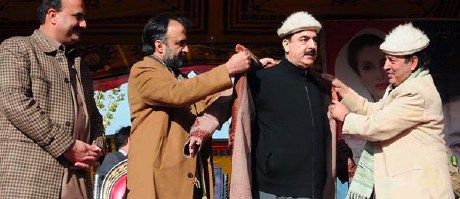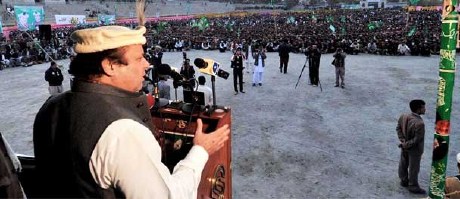Adil Najam
Today is a good day for democracy in Pakistan. The Gilgit-Baltistan region goes to poll for the first time to elect a legislative chamber of their own. Full franchise needs to be extended to each and every Pakistani, everywhere in Pakistan. One hopes that this step will be extended soon to other parts of Pakistan that remain without direct and full adult franchise.


The political implications of this step can be far reaching both for Pakistan and even beyond Pakistan. I personally think that the designation of Gilgit-Baltistan as an autonomous region is a first step towards the inevitability of the existing four provinces being sub-divided into a larger number of provinces. That prospect alone makes the political importance of this step far-reaching.
It may be too early to predict the shape of possible implications, but it is timely to think about steps than will ensure that these implications are positive for the Gilgit-Baltistan region and for the country as a whole. What is already interesting is to watch the political dynamics unleashed by these elections. Given that new ‘electoral capital’ is being created with the creation of a new Assembly, new seats, and new regional power players, it is not surprising that established political players in the rest of the country are putting their all into these elections. The biggest names in Pakistan politics are all traveling North to make sure that their party can capture this new ‘electoral capital’ and gain the advantage in future elections. This, itself, is a good sign.
The editorial in Dawn, gets it right:
AMID the disquieting news from elsewhere in the country, there is a glimmer of hope in the form of the Gilgit-Baltistan Legislative Assembly elections scheduled for tomorrow. Twenty-three seats will be contested in the new-look assembly following the federal government’s Gilgit-Baltistan Empowerment and Self-Governance Order, and the contests have attracted an impressive array of national political leaders who have gone to the area to campaign for their local candidates. Despite the push by national parties, local politics and personalities are expected to play an influential role in the elections and therefore it is difficult to predict the results. Having said that, the PPP and the PML-N (and its rump, the PML-Q) have traditionally been the dominant players and that pattern is expected to continue. The PPP will likely be boosted by the Self-Governance Order and the usual ploy of doling out state patronage in the run-up to elections. The MQM is a new player in the area and may pick up a couple of seats on the back of enticements offered to Baltistanis living in Karachi. Many, if not most, Pakistanis will be unaware of the steadily growing influence of religious extremism in the area and one positive of the high-profile campaigning by mainstream political parties may be that the space gained by extremists will be gradually rolled back.
The elections, though, will be no panacea. The usual campaign promises have been made by candidates, but the socio-economic problems are serious. For example, Gilgit city has no sewerage system or major hospital, issues that have not drawn the attention of candidates. Meanwhile, in the Ghanche district of Baltistan, a major demand of the people is the re-opening of the Kargil-Ladakh route so that families separated by the LoC can reunite or meet again, but candidates have shied away from the issue. Additionally, the federally dominated Gilgit-Baltistan Council is expected to wield the real power and the Self-Governance Order is a halfway house between local governance and full-fledged constitutional and provincial status. Still, the elections are a start and a much-needed fillip in a country reeling from dismal news.
More details on the election, from a news report in The News:
Over 7,17,286 voters will elect members of the Gilgit-Baltistan Legislative Assembly today (Thursday). More than 250 candidates are taking part in the election being held in 23 constituencies out of 24. There would be no polling in constituency GB-19 where election was postponed due to the demise of MQM candidate Sher Bahadur Khan. According to the Election Commission, 3,32,377 female and 3,84,909 male voters would cast their votes to elect 23 members for the assembly.
The Election Commission has made elaborate arrangements to ensure smooth conduct of election. It has set up 982 polling stations in all six districts of Gilgit-Baltistan, of which 253 are reserved for women while 258 for male voters. Besides 511 mixed polling stations, the Election Commission has declared 153 polling stations sensitive and 119 stations very sensitive. An election cell and a control room have also been established to address complaints or give information about the polls. Moreover, in order to conduct the election in a smooth manner, 24 returning officers and 25 assistant returning officers have been deployed while more than 3,000 polling staff has also been assigned duties on the polling day.
Foolproof security measures have been adopted under which around 5,000 security staff is deployed at the polling stations, especially the sensitive and highly sensitive stations. Two battalions of the Army have been called and moved to different areas of the region. Army soldiers would be available on a call in case of any emergency. Meanwhile, political activities and election campaign ended at midnight on Wednesday under the election order. The Chief Election Commissioner (CEC) of the area, Rahim Nawaz Khan Durrani, has directed all the district election commissioners and polling staff to ensure on time arrival at their respective stations.



















































finally..
it makes me glad that our gilgit people have had an opportunity to have an elected local govt..
the excitement was amazing..like jashn e nouroz
a new beginning for a people with no political or representative status for sixty some years.
PPP has been well known locally for a number of years.
politics and electoral process was supervised by our judiciary
probably the most organised electoral process in subzero temeratures.
It is a good development indeed. There may have been rigging but there is a limit to how much rigging can be done. According to some doctors in my family who had recently travelled to Skardu to provide free services at the government hospital confirmed PPP popularity in the area. Also, given the large Ismaili community in the area, it is no surprise that PPP would do well and that even MQM could bag a seat.
There were many anti-Taliban banners there and the people of Skardu were proud that Masha’Allah there is peace there. The pro Taliban parties like PTI were bound to lose—not to mention that their candidates are often the dumbest.
Elections update results is available of Jang Group Website:
http://www.geo.tv/important_events/2009/gilgit_bal tistan_election/pages/results.asp
“Today is a good day of democracy…”
Which democracy we are talking about ?
Dr.Mubashir Hassan, the chief architect of PPP charter, just recently said that we were naïve and were proven wrong In 1967 when we thought that we can make a change by winning elections and becoming members of assemblies and ministers. When the whole state infrastructure is in shambles, where there is a nexus between the powerful civil and military bearucracy and also the landlords, land mafia, sugar / fluormill owners, no matter what elections you conduct there will be no change.As he had said that we need to make drastic changes to the whole state infrastructure in order to make the democracy work for the betterment of common man.Sugar crisis is a perfect example where the judiciary’s ruling became just a ruling and the executive could not even implement it. How can any isolated judicial activism will give any respite to the common man.
Even in these elections we are hearing same pre poll rigging and other common issues and these elections are a reflection of our national political structure.
Listen to his thoughts on his audio interview which he gave it to a local US Urdu Radio station
http://www.abnchicago.org
Welcome development. It appears that voting was peaceful. This process should be extended to other federally administered regions. People of the region need to be empowered.